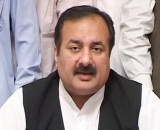IMF does not want Pakistan to count on FODP promises

Pakistan had borrowed $2.5b through Eurobonds on March 30 by offering lucrative interest rates to lenders. PHOTO: FILE
“It was a mistake that the government made the current budget on the basis of Friends of Democratic Pakistan’s (FoDP) promises”, said sources, quoting Adnan Mazari.
The IMF’s decision was conveyed to Islamabad by the IMF Director for the Middle East and Central Asia, Adnan Mazari, during his recent visit. This remark was prompted by the government asking the IMF for more money (extra ordinary facility for budget support) because the FODP had not given money they had promised.
An economic team, led by Shaukat Tarin, had estimated that Pakistan would receive $2.5 billion by June 2010 out of a total of $5.7 billion committed to Pakistan by the FODP.
The money has not materialised and a little over $600 million has been received so far. This amount also includes a rescheduled loan of $325 million of from the Islamic Development Bank.
The IMF has also informed Pakistan that it would withdraw the extra ordinary facility of budget financing from the next fiscal year and would not lend any money to Pakistan for financing its budget deficit, sources further disclosed to The Express Tribune, adding that the money could only be used for balance payments.
The Fund had approved an additional $3.3 billion including $1.2 billion for budgetary support on August 7 last year. The government had estimated the budget deficit at 4.9 percent of Gross Domestic Product or Rs 740 billion for the current financial year. The deficit target has been revised to Rs 769 billion or 5.1 percent of GDP.
This was because of lesser disbursements of Coalition Support Fund, fewer inflows from the FODP and more than expected spent on defence. The authorities were expecting that the budget deficit would end up around 5.8 per cent of GDP, said the sources, adding that, the government had already missed its nine-month budget deficit target.
An official of the Finance Ministry said that it would be difficult for Islamabad to arrange a major chunk of budget financing from domestic sources, as it would further burden commercial banks that are already facing liquidity problems. Furthermore the government may again resort to heavy borrowing from the State Bank, which may increase inflation, he added.
For the next financial year, the IMF has asked Pakistan to keep the budget deficit at 4.2 percent or around Rs750 billion, said the official. The government (taking a leap of faith) has again estimated that Islamabad would receive $2.5 billion from the FODP in July 2010 to June 2011, said another official source.
The IMF terms this “figure” to be “unrealistic.” It calculates that the government of Pakistan might get around $800 million from the FODP. But they believe that the money should not be a part of Pakistan’s budget financing, as there are a lot of risks involved with these uncertain inflows, said the official.
So far, for the next financial year the government has projected that other than the FODP commitments it would receive up to $4 billion from multilateral and residual donors who would help domestic financing, said the source.



















COMMENTS
Comments are moderated and generally will be posted if they are on-topic and not abusive.
For more information, please see our Comments FAQ